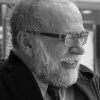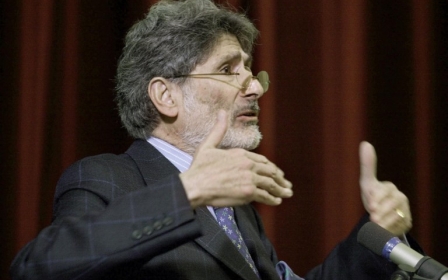On Edward Said and his enemies

Years after his untimely passing, the towering figure of Edward Said (1935-2003) still shines our path ahead as we navigate stormy waters in world history.
What was the sources and the reasons behind his uncompromising tenacity to speak truth to power, and how he did it happen that he enabled an entire generation of critical thinkers to do the same?
The defining aspect of Edward Said’s moral and intellectual character as the leading spokesperson of the Palestinian cause was the manner in which he defined that seminal political cause of his and our generation in terms equally definitive to other crucial movements for justice around the globe.
Edward Said was exactly the opposite of nativists who define the terms of their particular politics at the expense of others
He was exactly the opposite of nativists who define the terms of their particular politics at the expense of others. This identification with Said was not merely at an emotive or charismatic level. It was deeply moral and a matter of ethical principle that was in turn translated into solid intellectual and theoretical terms.
I have been a participant witness to two major occasions, merely the tip of an iceberg, when the universality of Said’s political and intellectual appeal were on the global stage. First was in October-November 2000 when the Italian Academy for Advanced Studies at Columbia University, where Said taught for decades until his passing, hosted the eminent founding figure of the school of subaltern studies, the Indian historian Ranajit Guha, to deliver a series of lectures.
New MEE newsletter: Jerusalem Dispatch
Sign up to get the latest insights and analysis on Israel-Palestine, alongside Turkey Unpacked and other MEE newsletters
On this instance my other distinguished Columbia colleague Gayatri Spivak and I organised a two-day conference around Guha's lectures that we called, "Subaltern Studies at Large". Said was present at this conference and gave a keynote speech at its first plenary session.
We had invited leading critical thinkers and scholars from Asia, Africa, Latin America, Australia, Europe and the US - and the very vocabulary of our discussions were almost entirely varied articulations of Said’s work.
On another occasion in April 2003, just months before his death, as the chair of my department I organised an international conference on the 25th anniversary of publication of Said’s Orientalism, to which again we had invited eminent scholars from literally four corners of the world, with Said giving the concluding remarks.
In this conference too we were all witness to the manner in which the seminal centrality of Said’s Orientalism had global resonances perhaps even beyond his own initial expectations. One could see how the works of critical thinkers from Nietzsche to Gramsci to Adorno to Fanon had all come to a crescendo in Said’s work.
Vilifying Said
I share these memories to underline my suggestion that much of the civilised and cultured world, the morally and politically caring and conscientious world, has reasons to know, love, and now remember and admire Said for objectives domestic to their own political projects.
Said of course had his share of sworn enemies, nefarious forces who were invested in seeking, in vain, to vilify him. Recently I came across yet another of these dime-a-dozen pieces, this time in Newsweek, of all places.
It now turns out that the opinion page of Newsweek has become a territory occupied by a pro-Israel editor who is using this forum to promote hatred of Arabs and Muslims (Palestinians in particular), to vilify the Black Lives Matter uprising, and to seek to secure four more years of Trump’s vicious lunacy, all so Israelis can steal the rest of Palestine in one final act of armed robbery.
All such pieces share a common fallacy: they are all barking up the wrong tree. Said is not where they are barking. He is somewhere else.
Shared humanity
In his lifetime commitments and example, Said crafted a particular kind of public intellectual that engaged with the dominant issue of his time, for him focused on the issue of Palestinian national aspirations, in non-Eurocentric universal terms.
It is this crucial sense of shared humanity that brought Palestine to the epicentre of global dialogue. Said engaged with Palestine on such a deeply humanist level that he helped globalise the Palestinian cause in terms that would dismantle the Euro-universalism he had challenged in much of his scholarly work.
Two major intellectual trends are definitive to much of the 20th century American scene - otherwise bereft of any homegrown intellectual tradition: the Jewish immigrant intellectuals of the 1930s and after, and the African-American intellectuals of the Harlem Renaissance and after, with Hannah Arendt and James Baldwin as the paramount examples of each.
In the first case, the US became the beneficiary of the murderous atrocities of the Nazis in Europe, and in the second, the selfsame scene was graced by an epochal turn in the moral and intellectual imagination of a nation by the victims of a terrorising racism that had targeted African-Americans.
The exilic intellectual
As an inheritor of these two traditions, Said’s lifetime achievement is to have crafted a position for an Arab or Muslim or immigrant intellectual right in between these two powerful traditions, in between Arendt and Baldwin, as it were. Edward Said himself did not see it that way, as he deeply identified with the German-Jewish philosopher Theodor Adorno, and considered himself in exile and thus theorized the exilic condition.
It is far more accurate to see Said as globalising a new category of organic intellectual somewhere in between the immigrant Jewish and the disempowered African American intellectuals
But from under the shadow of this category of exilic intellectuals of course emerged the native informers like Fouad Ajami. Far more accurate is to see Said as globalising a new category of organic intellectual somewhere in between the immigrant Jewish and the disempowered African American intellectuals.
It is precisely this iconic position of Said within a uniquely American experience that deeply troubles the racist Zionists, who thought they had the American market cornered for their wicked thieveries in Palestine. Right at the heart of the empire they keep milking for weapons and political protection emerged one singularly powerful voice: Edward Said.
Of course, they hate him with a vengeance, for precisely the same reasons that the world at large deeply loves and admires him. They "accuse" Edward Said of having inspired aspects of the Black Lives Matter uprising.
This is not an accusation. This is a cause for celebration.
Of course Said was an inspiration to African Americans in their historic struggles for justice, and today in justly celebrated figures like Angela Davis, Cornel West, Alice Walker, and Eddie S Glaude Jr, we hear loud and clear the echoes of Said’s voice and the manner in which he has extended the power of his charismatic intellect to the Black Lives Matter movement.
And no Arab, no Palestinian, no one in Asia and Africa and Latin America who equally cares for the just cause of Black Americans and Palestinians alike could be prouder of Said for this seminal role.
The views expressed in this article belong to the author and do not necessarily reflect the editorial policy of Middle East Eye.
This article is available in French on Middle East Eye French edition.
Middle East Eye delivers independent and unrivalled coverage and analysis of the Middle East, North Africa and beyond. To learn more about republishing this content and the associated fees, please fill out this form. More about MEE can be found here.






